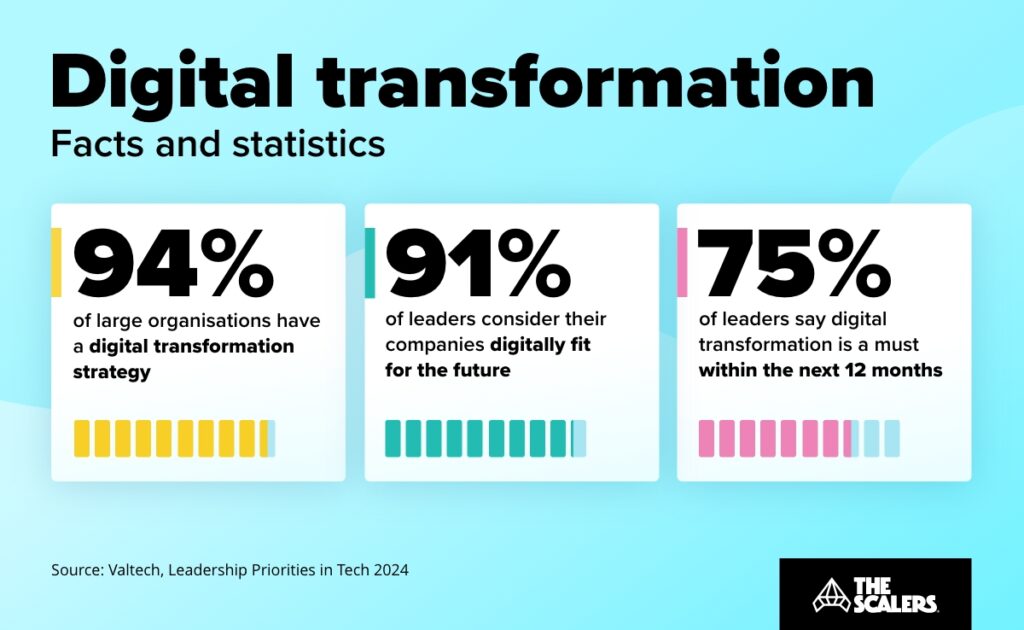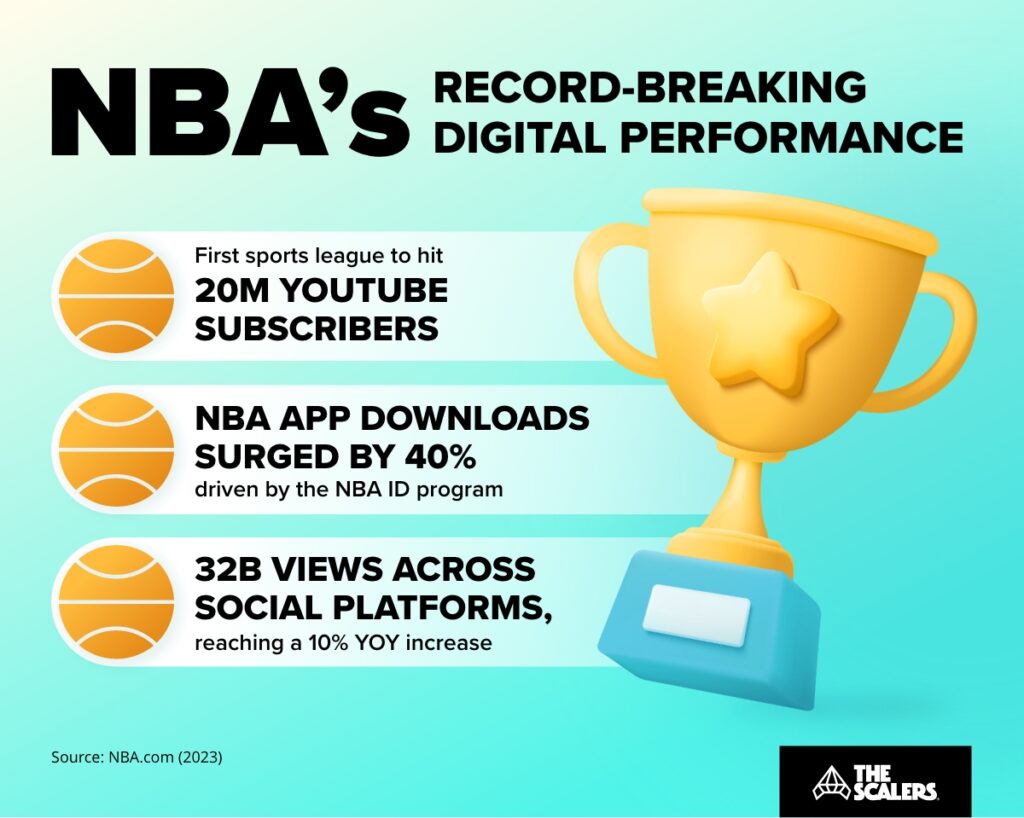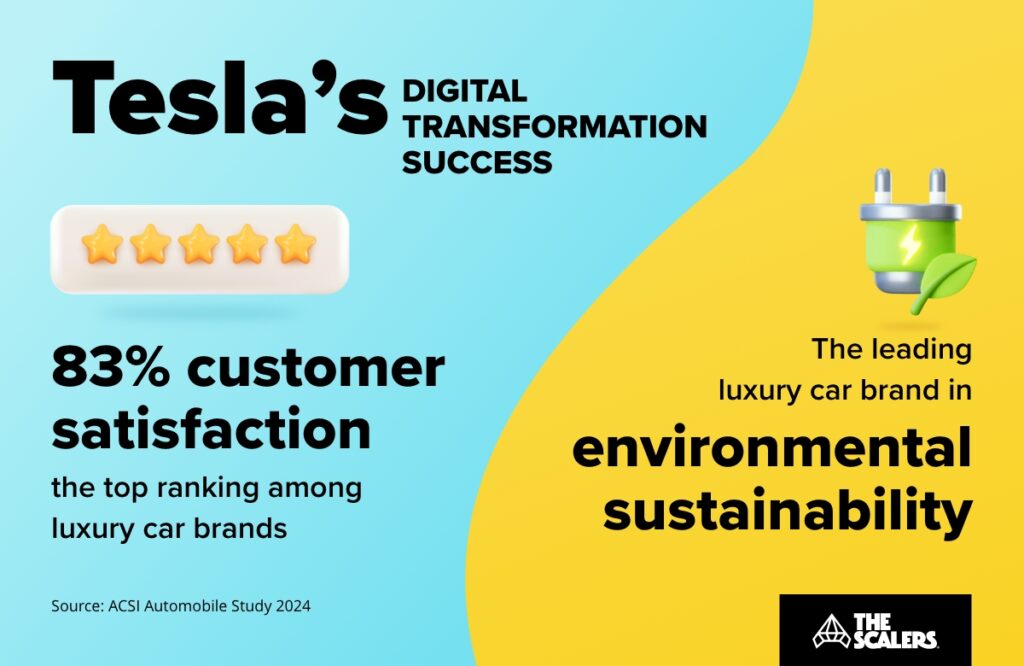Looking for some good old digital transformation success stories? We’ve curated some of the most impactful digitalisation journeys from organisations like Coca-Cola, Nike, and the NBA from the past few years.
We hope they inspire you or just help you understand how these industry giants have innovated to stay competitive for so long.
If you’re a business leader looking for the next big thing — perhaps you are already thinking about digitally transforming your business by extending your tech team — you’ll love this article.
Wait a second: what is digital transformation?
Digital transformation is a term that’s not only overused but also misused frequently.
To quote from technology authority Gartner, digital transformation can refer to “anything from IT modernisation (for example, cloud computing), to digital optimisation, to the invention of new digital business models. The term is widely used to refer to modest initiatives such as putting services online or legacy modernisation”.

What are the main benefits of digital transformation?
Businesses can benefit from digital transformation by:
- Improving customer experiences. For example, a company in the tourism industry can use virtual reality experiences to allow customers to preview destinations before booking their trips.
- Enhancing operational efficiency. For instance, manufacturing companies undergoing digitalisation can automate inventory management to speed up deliveries.
- Increasing revenue. An example of this can be a gym releasing a subscription-based fitness mobile application.
- Optimising data storage. Businesses that handle vast amounts of data, such as healthcare providers, can use cloud storage to safeguard patient data while still providing easy access for authorised individuals.
- Facilitating scaling and expansion. Take, for instance, a fashion brand that leverages advanced analytics to track market trends prior to opening stores in a new location.
Now that we’ve covered the definition of digital transformation and its benefits, let’s see how Ikea and Tesla, among other corporations, have successfully undergone digitalisation to remain at the forefront of their industries.
The 7 best digital transformation success stories
Here are seven powerful digital transformation stories from big brands:
1. IKEA
The famous Swedish home and furniture giant has shown that digital transformation isn’t limited to the FinTech space and the automotive industry.
Back in 2017, IKEA purchased the online service TaskRabbit to help customers who don’t like assembling their own furniture — a foray into software.
Next, the organisation dipped into the smart home sector by developing its own products and changing payment processing. By June 2021, the company reported a 73% increase in online retail sales as a direct result of their digital transformation efforts.
Today, IKEA is integrating AI and drone technology in warehouses to improve inventory management. As of 2023, the company has over 100 drones monitoring stock in 16 European locations.
We are committed to designing products and value chains for the future. We need to find new ways to lower our prices without compromising on quality or letting our environment pay the price.
2. AB InBev
You’ve probably never heard of AB InBev, but if we tell you it’s the multinational drink and beverage company responsible for building brands like Budweiser and Corona Extra, it might just ring a bell.
Besides creating these popular beers, AB InBev set up Bees in 2022, a B2B platform designed to help small and medium-sized retailers grow their businesses and find the right market fit. Bees offers services that go from gaining a distribution channel to digitising sales.
In other words, AB InBev is actively helping its partners transform digitally while undergoing its own digital transformation in the process.
The company also collaborates with changemakers to develop sustainable solutions for the next 100+ years of brewing in its Global Innovation Centre (GITEC), located in Leuven, Belgium.
3. NBA
It’s somewhat uncommon to mention a sports league when talking about digital transformation success stories, but the NBA is an exception.
The famous basketball competition not only has the privilege of having the best players in the world facing each other night after night but can also brag about their impressive digital transformation journey in the 2020s.
The NBA has recently deployed cloud, analytics, AI, and computer vision technologies to improve fan experience.
The launch of the NBA League Pass application in October 2022 — combined with a new partnership with Sony’s Hawk-Eye Innovations for 3D optical tracking — has enhanced how fans experience the game, both through streaming and advanced analytics.
Microsoft, the NBA’s tech partner, has also contributed to the league’s successful digitalisation. The aforementioned release of the League Pass service, plus the transition of products to the cloud, couldn’t have happened without the help of the tech giant.
The results? The NBA has experienced a 52% increase in viewership since partnering with Microsoft.

4. Coca-Cola
Arguably the most iconic brand in the world, Coca-Cola has implemented a digital transformation strategy focused on digital media. Today, 60% of the brand’s media spend is digital, whereas in 2019 it was only 30%.
Coca-Cola has also invested heavily in AI to improve customer experience and engagement. Good proof is its AI-powered holiday card generator, a tool anyone can use to design Christmas cards and send them to friends and family via WhatsApp or other messaging apps.
The brand even co-created a limited edition beverage assisted by AI. The Coca‑Cola Y3000 Zero Sugar was released by the end of 2023 with a design that, according to the company, “showcases liquid in a morphing, evolving state, communicated through form and color changes that emphasise a positive future.”
Whether these initiatives can stand the test of time — amid claims that Coca-Cola is struggling to win over Gen Z — the brand still holds the #1 spot in the cola wars over Pepsi and Dr Pepper.
One of the things about driving risk-taking and innovation is not to let the fear of what you’re going to lose obscure the possibility of what you might gain.
5. Audi
Audi’s iconic slogan, ‘Vorsprung durch Technik’ — ‘Progress through Technology’ in English — provides anyone unfamiliar with the brand a glimpse into what the company has been doing since its foundation.
The German car manufacturer is one of the pioneers in digital transformation in the automotive industry, with innovations that have always put it a step ahead of its competitors.
In fact, the Audi Quattro from 1983 was able to talk to drivers! This was, obviously, not an AI feature, but a repertoire of 15 sentences voiced by a radio presenter implemented into the car’s onboard computer.
Today, the new Audi Q6 e-tron has surpassed every dream the brand could have imagined 40 years ago. The Premium Platform Electric (PPE) is the company’s latest technology bringing vehicle digitalisation and customer experience to a new level.
Unlike 1983’s quattro, the Q6 e-tron has a virtual assistant integrated in the vehicle and visualised in the car’s dashboard through an avatar.
6. Nike
Nike is going through a harsh time as we write these lines. In July 2024, the brand had the worst day in its 53 years of history with its market capitalisation dropping by $28 billion in a single trading day.
However, the sports giant has proved time after time its resilience and adaptability to the changing times in its industry. For instance, Nike was one of the companies that best leveraged the ‘sneaker fever’ from the late 2000s to the mid-2010s.
At this moment, Jordan 1s and Air Maxes went from being a cultural icon and niche product for sneakerheads to be must-have shoes for (literally) everyone. To respond to this demand, Nike launched the SNKRS app in 2015, a platform where consumers get insider access to the newest drops and limited-edition releases from the Nike and Jordan Brands.
SNKRS represents a fundamental part of the company’s DTC strategy, transforming how the company communicates and fosters lasting relationships with its most loyal fanbase.
7. Tesla
By the time we finish writing this sentence, Tesla might have announced the launch of the latest and most advanced innovation in electric car manufacturing or solar energy. That’s how fast the company is designing and developing new technologies in its sector.
Tesla’s digital transformation success story can’t be explained without mentioning its CEO Elon Musk. Back in 2006, he ideated a master plan that would ultimately define the company’s future… and achieved every single goal.
Since the publication of Musk’s first master plan, the company has released two more plans pivotal to Tesla’s digital transformation.
The last one, published in 2023, serves as a roadmap for achieving a sustainable global energy future by transitioning to electric-powered end-use applications and relying on renewable electricity generation and storage solutions.
In the process of completing Master Plan Part 3, Tesla is redefining EV supply chains to deliver greater positive environmental and social impacts compared to traditional ICE vehicle supply chains.
The organisation’s unique approach includes direct sourcing of critical minerals from mines, refiners and smelters, supplier-specific decarbonization, and innovative recycling of battery materials.
An example of Tesla’s commitment to sustainability is the replacement of toxic substances at its Texas lithium refinery with reusable compounds.

Small and medium business transformation success stories stories
Digital transformation stories aren’t exclusive to the big leagues. Some small and medium-sized businesses have also achieved extraordinary results from digitalising operations.
That’s the case of Hesus, Medionalum, and Ykone. These three successfully digitally transformed through The Scalers’ unique and proven offshore model:
- Hesus achieved digital transformation, sustained rapid growth, and expanded into new markets with a dedicated offshore development team in Bangalore, India.
- Medionalum built a scalable offshore analytics team, modernising processes and driving smarter investments.
- Ykone transformed its software operations by building a dedicated offshore team in Bangalore, enabling the creation of an advanced influencer marketing analytics platform.
The Scalers are experts who really understood how Hesus could achieve wholesale digital transformation. Our development team in Bangalore has been transformative for Hesus. With their support we’ve been able to sustain the growth we wanted, drive the business into the digital age, and successfully launch into new markets.
If you want to know more about The Scalers’ offshore model and how we can help you accelerate your digital transformation journey, fill out this contact form.One of our senior executives will come back to you promptly.
If, instead, you’d like to read more success stories similar to Hesus’, Medionalum’s, and Ykone’s, we invite you to read our case studies featuring Preqin, Nextpoint, and other industry leaders.
In summary
Each digital transformation story is one of a kind, influenced by the industry, the economy, and other unique challenges along the way. While IKEA revolutionised the century-old furniture sector, Tesla pioneered the emerging electric vehicle and sustainable energy market.
Either way, the impact of digitalisation is undeniable, both internally and externally. As we’ve seen in the seven stories shared in this article, those who embrace change and leverage technology are rewriting their industries’ rules.
Key takeaways
-
1
Digital transformation involves adopting digital technologies to reshape business processes, driving improvements in customer experience, operational efficiency, and revenue growth.
-
2
Big brands like Ikea and the NBA have enhanced customer experiences via digital transformation.
-
3
Smaller companies like Hesus and Medionalum have expanded to new markets and modernised processes through the digitalisation of their operations.
-
4
Offshoring is a way to drive the technological change needed for digital transformation.
-
5
The Scalers’ unique offshore model has helped multiple organisations to digitally transform by building dedicated tech teams with the top 1% of Indian tech talent.
Want to know what are the trends shaping businesses in the near future? We’ve written an in-depth guide analysing the top pivotal digital transformation trends for 2025 that you might find interesting.
Build Your Team,
Not Just a Contract
With The Scalers’ offshore dedicated development team, you get engineers who join your workflow for the long run. Grow steadily, stay flexible, and work with people who care about the product as much as you do.







